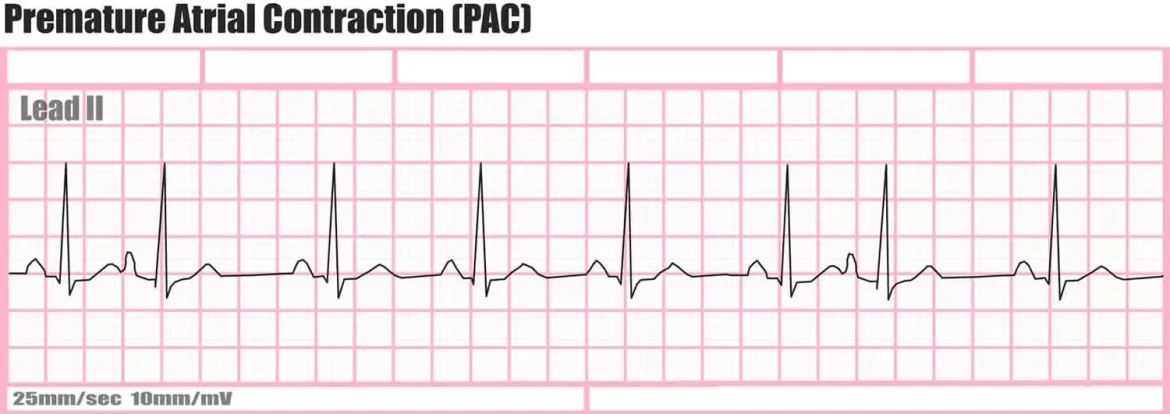Premature atrial contractions (PACs) are a type of irregular heartbeat that originates in the upper chambers of the heart, known as the atria. While PACs are generally considered benign and not life-threatening, there are certain situations where they may warrant closer attention and medical intervention. In this article, we will explore what premature atrial contractions are, their causes, symptoms, diagnosis, and when you should be concerned about them.
Understanding Premature Atrial Contractions
Premature atrial contractions occur when the heart’s electrical signals cause the atria to contract prematurely, disrupting the normal rhythm of the heartbeat. These contractions can feel like a fluttering or pounding sensation in the chest and are often described as skipped beats. While PACs are common and usually harmless, they can sometimes be a sign of an underlying heart condition.
Causes of Premature Atrial Contractions
1. Stress and Anxiety: Emotional stress and anxiety can trigger premature atrial contractions in some individuals. Managing stress through relaxation techniques and stress-reducing activities can help alleviate PACs.
2. Caffeine and Stimulants: Consuming excessive amounts of caffeine or stimulants like nicotine can increase the frequency of premature atrial contractions. Limiting intake of these substances may reduce PACs.
3. Electrolyte Imbalances: Abnormal levels of electrolytes such as potassium, magnesium, and calcium can affect the heart’s electrical activity and lead to PACs. Maintaining a balanced diet and staying hydrated can help prevent electrolyte imbalances.
4. Heart Conditions: Underlying heart conditions such as atrial fibrillation, atrial flutter, or heart valve abnormalities can predispose individuals to experiencing premature atrial contractions. Proper management of these conditions is essential in reducing PACs.
Symptoms of Premature Atrial Contractions
The symptoms of premature atrial contractions can vary from person to person. Some individuals may not experience any symptoms at all, while others may notice:
- Irregular heartbeat or palpitations
- Fluttering or pounding sensation in the chest
- Feeling of skipped beats
- Light-headedness or dizziness
- Fatigue or weakness
- Shortness of breath
It’s important to note that while PACs can be uncomfortable or concerning, they typically do not pose a serious health risk on their own.
Diagnosis of Premature Atrial Contractions
If you experience symptoms suggestive of premature atrial contractions, your healthcare provider may recommend several tests to diagnose and evaluate the condition:
1. Electrocardiogram (ECG or EKG): This test records the electrical activity of your heart and can detect irregularities such as premature atrial contractions.
2. Holter Monitor: A portable device that continuously records your heart’s activity over 24 to 48 hours, providing a more comprehensive view of any irregular heartbeats.
3. Event Monitor: Similar to a Holter monitor, but worn for a longer period of time and activated by the patient when symptoms occur, allowing for the recording of specific events.
4. Echocardiogram: This ultrasound test creates images of your heart and can identify any structural abnormalities that may be contributing to PACs.
When to Worry About Premature Atrial Contractions
While premature atrial contractions are often benign, there are certain scenarios where they may indicate a more serious underlying issue or require medical attention:
1. Frequent or Persistent PACs: If you experience frequent or persistent premature atrial contractions, especially if they are accompanied by other symptoms such as chest pain, shortness of breath, or fainting, it’s important to seek medical evaluation.
2. History of Heart Disease: Individuals with a history of heart disease, such as coronary artery disease, heart failure, or previous heart attacks, may be at a higher risk of complications from PACs and should monitor their symptoms closely.
3. Impact on Quality of Life: If premature atrial contractions significantly impact your daily activities, sleep, or overall well-being, discuss your concerns with your healthcare provider. They may recommend additional tests or treatment options to manage your symptoms.
4. Presence of Other Heart Rhythm Disorders: If you have other heart rhythm disorders such as atrial fibrillation or atrial flutter, the presence of PACs may indicate a more complex arrhythmia pattern that requires specialized care.
Treatment and Management of Premature Atrial Contractions
In many cases, no specific treatment is required for premature atrial contractions, especially if they are infrequent and not causing significant symptoms. However, lifestyle modifications and medications may be recommended to manage PACs and reduce their frequency:
1. Lifestyle Changes: Adopting a heart-healthy lifestyle that includes regular exercise, a balanced diet low in caffeine and stimulants, stress management techniques, and adequate sleep can help reduce the occurrence of premature atrial contractions.
2. Medications: In some cases, medications such as beta-blockers or calcium channel blockers may be prescribed to help regulate the heart’s rhythm and prevent PACs.
3. Electrophysiology Procedures: For individuals with severe or persistent premature atrial contractions, procedures such as catheter ablation or implantation of a pacemaker may be considered to restore normal heart rhythm.
Conclusion
Premature atrial contractions are a common type of irregular heartbeat that are typically benign and do not require treatment in most cases. However, individuals experiencing frequent or persistent PACs, especially those with a history of heart disease or other cardiac conditions, should seek medical evaluation to determine the underlying cause and appropriate management. By understanding the causes, symptoms, diagnosis, and when to seek medical attention for premature atrial contractions, individuals can take proactive steps to maintain heart health and overall well-being.


